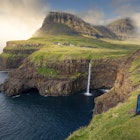
Mar 7, 2024 • 6 min read

Dec 9, 2020 • 2 min read
{
"url": "faroe-islands-underwater-roundabout",
"destination": "Faroe-Islands",
"continent": "Europe",
"region": "Faroe-Islands"
}An aquatic-themed underwater roundabout – the first in the world – will soon open below the Atlantic Ocean, linking up two of the Faroe Islands. The structure, made of natural rock and decorated by Faroese artist Tróndur Patursson, resembles a jellyfish and is illuminated with blue and green lights.

{
"url": "faroe-islands-underwater-roundabout",
"destination": "Faroe-Islands",
"continent": "Europe",
"region": "Faroe-Islands"
}The jellyfish roundabout lies at the end of a 11km-long tunnel, called Eysturoyartunnilin, which connects two of the most populous islands. Local leaders hope that the improved transportation link will help encourage tourism after the coronavirus pandemic subsides. The travel time between the capital of Tórshavn and Runavík/Strendur will be cut from more than an hour (64 minutes) to just 16 minutes. The drive from Tórshavn to Klaksvík will be shortened from 68 minutes to 36 minutes, according to the the company behind the project. The roundabout also seems set to become a tourist attraction in its own right, with photos of the project being shared widely on social media.
Construction of the tunnel started in 2016 and will officially open on 19 December. Another tunnel of similar length will open in 2023, marking the completion of the country’s largest-ever infrastructure project. The deepest part of the tunnel is 187m below sea level. Cars will be charged 75 Danish kroner (about US$12) as a toll for a one-way journey, or commuters can pay for a yearly subscription.

{
"url": "faroe-islands-underwater-roundabout",
"destination": "Faroe-Islands",
"continent": "Europe",
"region": "Faroe-Islands"
}The remote and rugged Faroe Islands are an archipelago of 18 inlets halfway between Norway and Iceland and are an autonomous territory of Denmark. Lonely Planet included the Faroes on its Best in Travel list for 2021 for Community Immersion, thanks to opportunities for slow travel and sustainable tourism. Each April, the Faroe Islands close for maintenance as locals host 100 voluntourists who come to mend hiking paths, rebuild cairns and help to preserve the natural landscapes.
Editor's note: This article originally stated the drive from Tórshavn to Klaksvík would be shorted to 16 minutes. The drive from Tórshavn and Runavík/Strendur will be cut to 16 minutes.
Museum of Underwater Art has been created at Australia’s Great Barrier Reef
Norway’s new waterfront park will have an underwater diving trail
Explore ancient shipwrecks in Greece's first underwater museum
{
"url": "faroe-islands-underwater-roundabout",
"destination": "Faroe-Islands",
"continent": "Europe",
"region": "Faroe-Islands"
}

Mar 7, 2024 • 6 min read




Mar 1, 2024 • 6 min read

Oct 28, 2021 • 2 min read

Sep 30, 2021 • 4 min read

